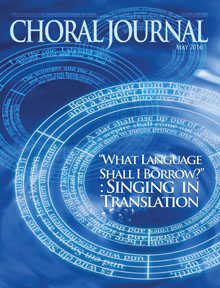The May 2016 issue of the Choral Journal features a cover article written by Daniel Mahraun titled “What Language Shall I Borrow? Singing in Translation” in which he presents ways to make performance in translation “satisfying, not merely satisfactory.” (Read the entire article here)
Mahraun first revisits four arguments against translations that were listed by Roger Doyle in his 1980 Choral Journal article “What? Sing It in English? What Will the Neighbors Think?” (Click here to read Doyle’s article)
The arguments are:
- The nuance of the composer’s language is integral to the flow of the music.
- Translations are provided in the printed programs.
- The audience can’t understand the English either.
- Good English versions are very scarce.
Readers are then urged to consider the advantages of translations, and the author uses case studies from Mendelssohn’s “Es wird ein Stern” from Christus, Bach’s Matthäus-Passion, and Hindemith’s “La biche” from Six chansons to solidify his points.
When considering translations in choral singing, which side do you fall on? Do you think there can be benefits to singing in translation? Have you had any negative experiences? Positive? Can you think of any other works besides those listed above that might lend themselves to a satisfying performance in translation?
Feel free to share your thoughts here on ChoralNet in the comment section or even send in a “Letter to the Editor” for publication in an upcoming issue of Choral Journal. I would love to hear from you! Better still, perhaps you should write an article or column in the Choral Journal. You can contact me at . Daniel Mahraun can be contacted at .
Choral Journal writing guidelines can be viewed by clicking here.



Robert Leleu says
La plejparto de ĥoraj kantoj estas aparte por plezuro de la ĥoristoj kantitaj.
Dum koncertoj la aŭdantoj malfacile komprenas la vortojn, kaj se oni volas, ke ili komprenas, nur oni disdonu printitan tekston.
Multe pli gravas la kompreno de la ĥoristoj mem, por ke la aŭdontoj sentu la generalan signifon de la muzika verko.
Tamen, por muzikaj kialoj, prefereble kantu en la origina lingvo.